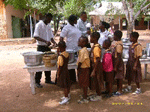Ghana: Lack of political will hampers development and human well-being
Published on Fri, 2012-12-14 08:38
The lack of political will seems to be the main obstacle on Ghana’s road to development and human well-being, but it is not the only one, according to the contribution from civil society organizations of this West African nation to the Social Watch Report 2013. In 2007, Ghana was hailed as one of the first countries in Sub-Saharan Africa on the right track to reach the MDG target of poverty reduction. Between 1992 and 2006 the proportion of those living below the poverty line fell from 36.5% to 18.2%. Enrollment has increased in primary and secondary education. Thus from 1991 to 2008 the levels of registration in kindergarten increased from approximately 56% to nearly 90%. In the same period primary school enrollment increased from 74%d to nearly 95%, and at the level of junior high school it increased from 70% to 79%. But the progresses were not enough to meet other goals. The number of women who die during child birth remains stubbornly high. Overall maternal mortality ratios fell from 540 per 100,000 live births to 450 per 100,000 live births between 1992 and 2008. But reducing the figure to the MDG target of 185 per 100,000 live births is unlikely to be achieved by 2015. The first obstacle to overcome is the lack of skilled health care personnel. There is also a gap between urban and rural areas, where the distances to a proper medical attention are challenging, reads the report. Another target that Ghana is unlikely to meet is the Goal 3, on the promotion of gender equality and women’s empowerment. There are even less women in decision-making positions. The female members of the Parliament dropped from 10% to 8.3 % between 2000 and 2012. Women make up only 16% of the ministerial positions and 10% of the deputy ministers. Between 2000 and 2008, Africa experienced a period of sustained growth, with yearly averages of nearly 5%, thanks to a high demand for commodities, inflows of aid, foreign investment, and political stability. Ghana has been described as a beacon of peace and reliability in West Africa, and that image helped to boost economic growth, together with the record high prices of gold and cocoa and with the discovery of commercial quantities of oil. Ghana was declared a middle income country in 2011. Ghana is in many ways a donor darling and over the years has received aid in the form of budgetary and projects support. From under USD 300 million during the 1990s, aid reached a peak USD 924 million in 2004. By 2009, aid to Ghana was about USD 820 million, most of it directed at the energy sector in the form of loans, although a high percentage of grants were directed at the health sector. While the national economy was improving, steps were taken to address social challenges. The National Health Insurance Scheme was introduced in 2003. Its goal was to ensure equitable and universal health care services to all. The system was to be funded from taxes, social security contributions and annual premiums. Coverage was to include inpatient and outpatient services, and essential drugs, but not all medical procedures and services are covered by the system. The Free Maternal Health Care Policy, introduced in 2008, offers attention to pregnant women to reduce maternal and child mortality, and to encourage ante and post natal supervision. And prior to the MDGs, Ghana had adopted the Free Compulsory Universal Basic Education Programme. In 2005 it introduced the Capitation Grant and the School Feeding Programme to further encourage enrollment and attendance in primary schools. On the surface Ghana has significantly progressed in development issues. But despite the advances, many of the conditions that disempowered the poor and vulnerable remain, warns the Ghana Social Watch Coalition. Poverty has a different face. Despite the seemingly impressive growth, income and regional income disparities have been exacerbated in some instances – 28% of the population live with less than a dollar a day, according to the UNDP. Women in Ghana continue to be the heavily represented among the poor. The situation is even worse in the rural areas. Systemic and structural gender disparities hinder women’s access to productive resources and to their livelihoods. Health costs are prohibitive for the vulnerable, even with the introduction of the new system, that can be a time consuming experience. Not all health providers cover all drugs for the treatment of common ailments. Many patients must pay over the counter for drugs covered by the scheme. And despite the cost-free health care for pregnant women, maternal mortality continues to be high. Only 24% of women in the lowest quintile of income attend a health facility during childbirth. Many of them are poor women in rural areas, with large families (four to six children) and can not avail themselves of the free health services. The low number of women in decision-making positions prevents the adoption of measures to address the structural gender inequalities. The obstacles to women’s empowerment include traditional prejudices, negative perceptions about women in public positions and the lack of political will of the government and the parties, remarks the Ghana Social Watch Coalition. Despite the numerous official statements in support of the MDGs and other development goals, the political apathy could be the hardest obstacle, notes the study. Tackling the challenge will require a mix of financial resources and strong political will. While it is acknowledged that the targets set out by the MDGs are unlikely to be met by 2015, the discussion on the post-2015 development agenda is muted. Civil society continues to demand the government to provide the much needed support, financial and otherwise, to achieve a development that is sustainable and equitable for all. Source |
SUSCRIBE TO OUR NEWSLETTER



